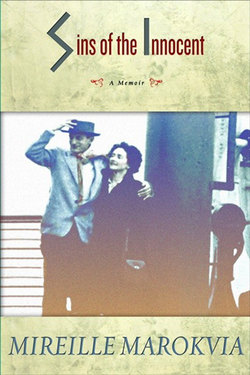Читать книгу Sins of the Innocent - Mireille Marokvia - Страница 6
На сайте Литреса книга снята с продажи.
I
ОглавлениеI shall call him Abel, a name that suited his fate.
Abel did not, any better than I did, discern the web that was being woven around us as the year 1939 dawned. On a frigid February night, I sat for the first time at his mother’s table. She was dignified and shy—and beautiful—under her helmet of white hair and in her high-collared long black dress. She welcomed me warmly, but her large blue eyes were on him, the prodigal son. They all had eyes and ears only for Abel. There was an older brother and his wife, an older sister and her husband, and the younger brother’s wife. They all were much taller and bigger than I, and they spoke a language I did not know.
Just before supper, younger brother made an entrance. Tall, gaunt, with a sallow complexion, he wore the brown uniform I had already learned to hate through Abel’s hatred. With expansive gestures he took off his greatcoat and visored cap—which his wife received devoutly. Was his yellow skull shaved or bald? All I knew about the man was that he was my age, thirty.
I stared at the blood-red armband with its black swastika as the younger brother extended garrulous greetings.
Abel, turning pale, blurted out a remark that caused an uneasy silence.
But cheerful young wife, who had been out of earshot in the kitchen, was just then rushing in with supper: a vast plate of cold cuts and sausage decorated with pickles, black bread in thin slices, and a tall, slender bottle of Rhine wine, rather than beer—in my honor, older brother amiably informed me in his broken French. I smiled feebly, evoked the velvety French soups of my childhood and grew sick with longing. The meal was short and the talk loud.
As we prepared to leave, Abel had an animated talk with his mother. She was offering something he was refusing, I understood.
Later, as we walked together on the cold street, Abel explained that his mother had had a room ready for me. The apartment she shared with her younger son, his wife, and their small child was quite large.
“No! I would not let you sleep under the same roof as that . . . uniform,” he exclaimed, his anger mounting. “Nobody told me that good-for-nothing had joined the SA. I beat him up years ago for running around with that rabble! They paid him with beer then for inciting brawls at political rallies. What did he do for them that they now reward him with an office position?”
Barely four months had passed since a friend of Abel’s had unexpectedly visited in Paris.
The moment I had caught sight of it at the door, I had hated the man’s handsome face, smiling above a pink azalea in bloom. He had come with a message: Abel’s mother was sick and so destitute she had had to borrow money from him repeatedly. Abel should return to “the Motherland” and take care of things as he had done in the past. Germany was prosperous and peaceful. Yes, yes, there had been some trouble lately—the Kristaalnacht in November—popular reactions, and quite legitimate too, after the murder of that German official in Paris by a Jew. The government would take appropriate measures, no doubt. Of course, the friend would gladly help Abel to find a good position.
And fast too. Abel had become an art director in an advertising agency in his mother’s town. I had just joined him. We were going to stay in Germany for six months. Abel had promised: six months.
“Mother looked better tonight,” he said, perhaps guessing my thoughts. “But she’s so courageous, one never knows.”
In orderly, ponderously handsome Stuttgart, all Abel had been able to rent was a maid’s room on the top floor of a neat house in the well-scrubbed suburbs. Everybody, he said, was on the lookout for a better place for us.
Our Paris atelier had had a luminous high roof made entirely of glass, a black stovepipe dizzily ascending to it. A trapeze hanging from the open rafters invited an athletic swing from the balconied bedroom onto the dining room table.
“Be brave,” I told myself. “Be brave.”
Instead, I took the coward’s path, I became ill.
